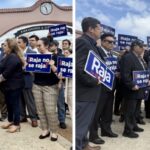Indian American Congressman Raja Krishnamoorthi (D-IL) has called for immediate accountability from the Department of Homeland Security (DHS) over its conduct during the ongoing government shutdown — particularly the furlough of its Office of Detention Oversight (ODO) and reports of mistreatment of journalists covering immigration enforcement at the ICE processing center in Broadview, Illinois.
In two separate letters sent late Thursday to Homeland Security Secretary Kristi Noem, Krishnamoorthi — who is also running for the U.S. Senate from Illinois — condemned DHS’s “profound failure of priorities” in suspending detention oversight while continuing full-scale enforcement operations.
“ODO’s inspectors are responsible for ensuring that facilities meet federal health, safety, and humane treatment standards,” Krishnamoorthi said in a statement. “With detention levels now among the highest in more than a decade, suspending this critical oversight function while enforcement operations proceed uninterrupted is indefensible and represents a profound failure of priorities.”
“ODO’s inspectors are responsible for ensuring that facilities meet federal health, safety, and humane treatment standards,” Krishnamoorthi wrote. “With detention levels now among the highest in more than a decade, suspending this critical oversight function while enforcement operations proceed uninterrupted is indefensible and represents a profound failure of priorities.”
Despite DHS retaining roughly 92 percent of its workforce, Krishnamoorthi said the ODO has been entirely furloughed, leaving more than 60,000 individuals in federal custody without independent inspections or accountability. He questioned why the ODO was shut down even as the department’s press and communications staff remain fully operational, and demanded a breakdown of furloughed personnel, the rationale behind the decision, and clarification on who—if anyone—is inspecting detention facilities during the shutdown.
In a second letter, Krishnamoorthi expressed deep concern over the treatment of journalists covering immigration enforcement in the Chicago area. He underscored that “a free and independent press is essential to public accountability and the rule of law,” warning that intimidation or force against reporters “has no place in a democracy.”
He cited multiple verified reports of clearly identified journalists in Broadview being shot with pepper balls, exposed to tear gas, and, in at least one instance, arrested while reporting. In another case, a CBS Chicago reporter’s vehicle was allegedly hit by a pepper-ball round, dispersing chemical agents into the cabin.
Referencing the case Chicago Headline Club v. Noem, the Congressman noted that federal agents—“often masked and operating in combat gear”—allegedly deployed tear gas, flash grenades, and rubber bullets at journalists following police instructions. He said such conduct “raises serious constitutional concerns and demands accountability from DHS leadership.”
Krishnamoorthi also cited reports that hundreds of federalized National Guard troops are operating in and around Chicago under presidential authority now being challenged in federal court. “These developments underscore the urgent need for DHS to reaffirm its obligation to uphold—not suppress—the First Amendment rights of journalists and peaceful assembly,” he wrote.
To restore public trust and ensure press freedom, the Congressman requested DHS provide:
- All policies and training materials regarding interactions with journalists;
- Any operational plans or directives from Operation Midway Blitz related to media access, safety zones, and use-of-force thresholds;
- Incident-level data on use of force or detentions involving journalists since September 1, 2025; and
- Details of coordination with National Guard units or local authorities concerning media access and crowd control.
He further urged DHS to adopt an explicit arrest-avoidance policy for journalists, require visible identification for all agents, and convene meetings with press-freedom groups and Illinois news outlets to create transparent press-police protocols.
“Oversight and transparency are not optional; they are essential for maintaining public trust in the U.S. government,” Krishnamoorthi wrote. “At a time when that trust is historically low, DHS must recommit to accountability — both for how it treats those in its custody and those who report on it.”






